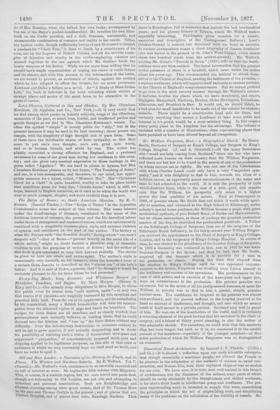Sir William Fergusson, Bert.: a Biographical Sketch. By Henry Smith,
Professor of Surgery at King's College, and Surgeon to King's College Hospital. (J. and A. Churehill.)—Of the many Seotchmen who "could not help coming from Scotland," there are few who have reflected more honour on their country than Sir William Forgnsson, and there are but few to be found in the annals of any of the professions on whom success sat so lightly. He was not one of the Caledonians with whom Charles Lamb could only have a very "imperfect sym- pathy," and it was delightful to find in him, towards the close of a brilliant career, an apparently grand unconsciousness of the name and fame he had achieved in the world. It is only the prosperity of fools which destroys them, while in the case of a wise, good, and capable man like Sir William, his prosperity only raises to a higher power the best qualities of his nature. Born at Prestonpans in 1808, of parents whom Mr. Smith does not think it worth while speci- ally to mention, and educated at the High School of Edinburgh, under nobody's special home guidance, Sir William became a pupil, with great mechanical aptitude, of poor Robert Knox, of Burke and Hare notoriety, but for whose instructions, as those of perhaps the greatest anatomical teacher of his day, he cherished the profoundest gratitude. A Follow of the Edinburgh College of Surgeons, then one of the surgeons of the Edinburgh Royal Infirmary, in his thirty-second year William Fergus- son received the appointment to the Chair of Surgery at King's College, London, and to the surgeoncy of King's College Hospital. In course of time, he was elected to the presidency of the London College of Surgeons, hi 1866 a baronetcy was conferred on him, and in 1867 ho was made Sorjoant-Surgeon to the Queen ; and thus ho bad, says Mr. Smith, acquired all the honoure which it is possible for a man in his profession to obtain. During the time that elapsed from his election to King's College until he was appointed serjeant- surgeon to the Queen, Fergusson was rivalling even Listen himself in the brilliancy and success of his operations. His performances in the cure of cleft palate, and in excision of the knee-joint and upper jaw, were an astonishment to the profession. His private practice was enormous, but in the midst of all his justly-earned honours, to meet Sir William in private was to find in him a genial, simple, genuine brother-man. The confidence he inspired in his patients was almost extraordinary, and the poorest sufferer in the hospital received at his hand an amount of tenderness, and thought, and care which no money could of itself secure to a private patient. Scotland may well be proud of him. Ho was.one of the benefactors of the world, and it is certainly a crowning element of his good•fortune that his successor in the chair of surgery, and a friend of thirty years' standing, is also the author of this admirable sketch. For ourselves, we could wish that this masterly doge had been longer, but such as it is, we commend it to the careful perusal of the members—especially of the younger members—of that noble profession of which Sir William Fergusson was so distinguished an ornament.






































 Previous page
Previous page